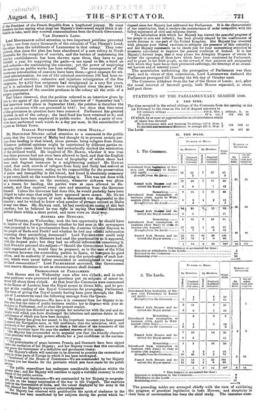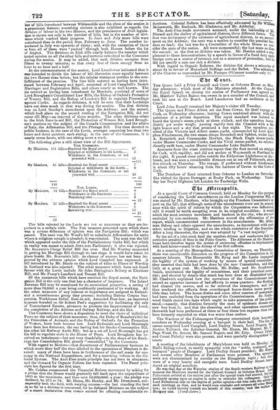STATISTICS OF THE PARLIAMENTARY SESSION 1849.
I. THE TIME
The time occupied in the actual sittings of the Commons from the opening on the 1st February to the close on the 1st of August amounts to
117 ordinary* sittings 855 h. 117m.1 sittings. h. In.
17 extra 67 h. 5m. J 134 922 42 Of which, by as near an approximation as circumstances admit of, there was devoted To Government bilis and business 76 sittings 527 h. 25m. } 134 922 42 To the hills andinotionaofMembers 38 sittings 395 h. 17m.
The Lords 94 257 25
2. The Lords.
Introduced from beginning of Sea aeon (1st February) to Easter (3t1 April) Brought from the Commons Passed both Houses and re- ceived the Royal assent ... • Remaining Introduced from resumption of business (19th April) to Whit suntide (26th May) Brought from the Commons • • Passed both Houses and re seised the Royal assent • • • Remaining Introduced from resumption of business (4th June) to close of
Session (let August)
Brought from the Common s Fassed both Houses and re- ceived the Royal assent .
* This balance Is accounted for thus : Rejected or withdrawn in the Commons Withdrawn in the Lords Remaining over
The preceding tables are arranged chiefly with the view of exhibiting the progress of practical legislation in both Houses; and simplicity in their form of construction has been the chief study. The immense num-
21 3 24 8 12 12 a 9 5 4 14
II. THE BILLS. NUMBER or Bum.
By Minister,. By Members. un all
41 England; 3 England.
CoSmilonaniesd. On other
Scotland;
Colonies. Irish Mils and
Bills. subjects.
1. The Commons.
Passed both $011150 and re- ceived the Royal assent ....
Remaining Introduced from resumption, of business (31st May) to clan of Session (1st August) Brought from the Lords Passed both Houses and re-
ceived the Royal assent • •
6
S
17 1
26
22
5
16
43
7 66 52
Introduced from beginning of Ses- sion (let February) to Easter
(4th April) Brought from the Lords.
Passed both Hoeft, and re- . mind the Royal assent • • • •
Remaining Introduced from resumption of business (16th April) to Whit- suntide (25th May) Brottald from Me Lords 16 3 2 * Thls balance is accounted for thus : Rejected or withdrawn In the Lords Rejected in the Commons Remaining over 20
Nt.xesa or Btsm.
By Ministers. By Menthol.
Total. Bills.
1
England. Scotland, m Cot hies.
4
T.,
1
TO England, Scotland, Colonies.
6
10 3 7
11
3 11
7 21 3 S
1 12
3
• s
4
8
13 6 3
9 7 10
14 81 6
11 1 5
14 20 1 2 2 5 10 20 46 3 8 '72 22 53
22 HU.
22 52
2
S 84
3 14 18*
Namara or DIVISION..
On all On other Irish Bills and Mils. subjects.
1 8 10 6 14
4 a 11 -18
leer-of bills introduced between Whitsuntide and the close of the session is *prominent feature; something curious is also exhibited as regards the division of labour in the two Houses-' and the prominence of Irish legisla- tion is shown not only in the number of bills, but in the number of divi- sions which marked their progress. In June and July more bills were introduced than in the period from February to June. The number in- troduced in July was upwards of thirty; and, with the exception of three or four, all of them were "pushed" through both Houses before the 1st of August. The divisions on Irish bills nearly balance the number which tested opinion on all the other bills and motions submitted to the Commons during the eession. It may be added, that each division occupies from fifteen to twenty minutes; so that every four of them occupy from an hour to an hour and a half.
At the commencement of the session, Lord Lansdowne intimated that it *as intended to divide the labour of bill-discussion more equally between the two Houses than'before; but the tabular statement testifies to the non- fulfilment of the promise. The four bills entered as having been intro- duced between February and April, consisted of Lord Campbell's Scotch Marriages and Registration Bills, and others nearly as well known. The six entered as having been introduced by Members, consisted of some of Lord Brougham's Consolidated Law Bills, the Bishop of Oxford's Protection of Women Bill, and the Bishop of London's Bill to regulate Proceedings against Clerks. As regards divisions, it will be seen that their Lordships &eve not done much' in that way during the session. The first division was on Lord Stanley's amendment upon the Address; and the second, which took place on the second reading of the Navigation Bill, did not occur till May—an interval of three months. The other divisions relate to the Irish Rate-in-aid Bill, the Protection of Women Bill, Lord Brough- am's motions on the subject of the Canada Compensation and the affairs of Italy, the Affirmation Bill, and the Pilotage Bill. The time devoted to public business, in the case of the Lords, averages somewhat less than two hours and three quarters each sitting; in the case of the Commons, it is iteas1y -seven hours, with one sitting more a week.
The following gives a still closer view of the Bill department.
THE Camisoles.
By Ministers, 101 bills—Received the Royal assent 87
Rejected or withdrawn in the Lords- 2. - Withdrawn in the Commons, or not proceeded with 12 —101 By Members, 45 bills—Received the Royal assent 7 Rejected or withdrawn in the Lords 8 Withdrawn in the Commons, or not proceeded with 116
--- THE Loans.
By hlinisters, . 12 bp—Received the Royal assent
111 Withdrawn in the Commons Remaining over By embers, 21 bills—Received the Royal assent Withdrawn in the Commons litemaining over 33 33
The bills rejected by the Lords are not so numerous as they are im- portant in a certain view. The first measure presented upon which there was a' serious difference of opinion was the Navigation Bill; which was passed. The next was Mr. Wood's bill to substitute Affirmations for oaths where a religious scruple is pleaded; it was rejected. The next was the bill -which appeared under the title of the Parliamentary Oaths Bill, but which in reality was meant to admit Jews into Parliament; it also was rejected. Mr. Bouyerie's Clergy Relief Bill lies over. Had Mr. Wortley succeeded in getting his Marriage Bill through its last stage, it would have taken its place beside Mr. Bouverie's bill: its chance of success has not been im- proved by the adverse opinion which Lord Campbell has expressed. A bill introduced by Mr. Maule on the subject of titles to Places of Worship in Scotland was also rejected. The other measures which have not found favour with the Lords include Sir John Pakington's Bribery at Elections Bill, and Mr. Pusey's Landlord and Tenant Bill. Of %he numerous bills which have received the Royal assent, the Navi- gation Bill is the only one that has a character of largeness. The Inland 'Revenue Bill may be mentioned for its economical properties, a saving of more than 70,0001. a year being confidently predicated of its working. All the other measures of any interest or importance are assigned to Ireland: and a. miscellaneous group they present; including Habeas Corpus Sus- pensioh, Workhouse Relief, Rate-in-aid, Amended Poor-law, an improved measure founded on Sir Robert Peel's suggestions for facilitating the sale of 'Encumbered Estates, advances- to promote the Improvement of Land, the coMpletion of the Athlone and Galway Railway, and the like.
Thd ComMons have shown a disposition to meet the views of individual Peers pn the subject of their measures: thus, the Duke of Beaufort's bill for the Protection of Animals, and the Bishop of Oxford's for the Protection of Woinen, have both- become law. Lord Redesdale and Lord Monteagle have leen less fortunate, the one having lost his Smoke-Consumption -Bill, the other his Railway Audit Bill; but as a set-off Lord Monteagle has got his bill to regulate costs in the [louse or Peers. Lord Brougham has re- ceived'an instalment—but not very thankfully—in the shape of his -Bank- rupt-law Consolidation Bill, greatly "remodelled " by the Commons.
With regard to Motions—that department of Parliamentary business to which more than half the time allotted to the operations of Members is de- voted:' many of them have been in furtherance of the call made for eco- nomy in the National Expenditure, and for a searching reform in the Co- lonial System. The Anti-Free-trade principle has not been in abeyance; and the demand for Organic Reform has been repeated. The Peace prin- ciple has figured for the first time.
- Mr. Cobden commenced the Financial Reform movement by asking for a pledge that the House would gradually fall back upon the expenditure of 1835 as the maximum, and thus save 10,000,0001. a year : the pledge was declined, by 275. to 78. Mr. Hume,Mr. Henley, and Mr. Drummond, sub- sequently took the field, with varying success,—the last standing the best in so far as a division is concerned, for he defeated Ministers on the subject -of a smart declaration that means existed for effecting considerable re- 30 — 45 14G
8 2 2 — 12 6 - 2 13 -
2,1
ductions. Colonial Reform has been effectively advocated by Sir Willhua Molesworth, Mr. Roebuck, Mr. Gladstone, and Mr. Adderley.
The Anti-Free-trade movement assumed, under the leadership of set Disraeli and the shelter of agricultural distress, three different forms. The first was declaratory of the existence of agricultural distress, in an amend_ ment on the Address; the next was a motion to consider the peculiar hr_ dens on land; the last was for a Committee of the whole House to con_ eider the state of the nation. All were unsuccessful; the last more so than the second; on the first no division was taken. Mr. Herries added a sup. plement to these demonstrations, by a speech in favour of a fixed duty upon foreign corn as a source of revenue, not as a measure of protection; but he did not specify a sum nor risk a division.
With regard to Organic Reforms, the division-list shows a minority of about 84 in favour of Household Suffrage and the Ballot. The adherents of the Charter as expounded by Mr. Feargus O'Connor number only 13.



























 Previous page
Previous page